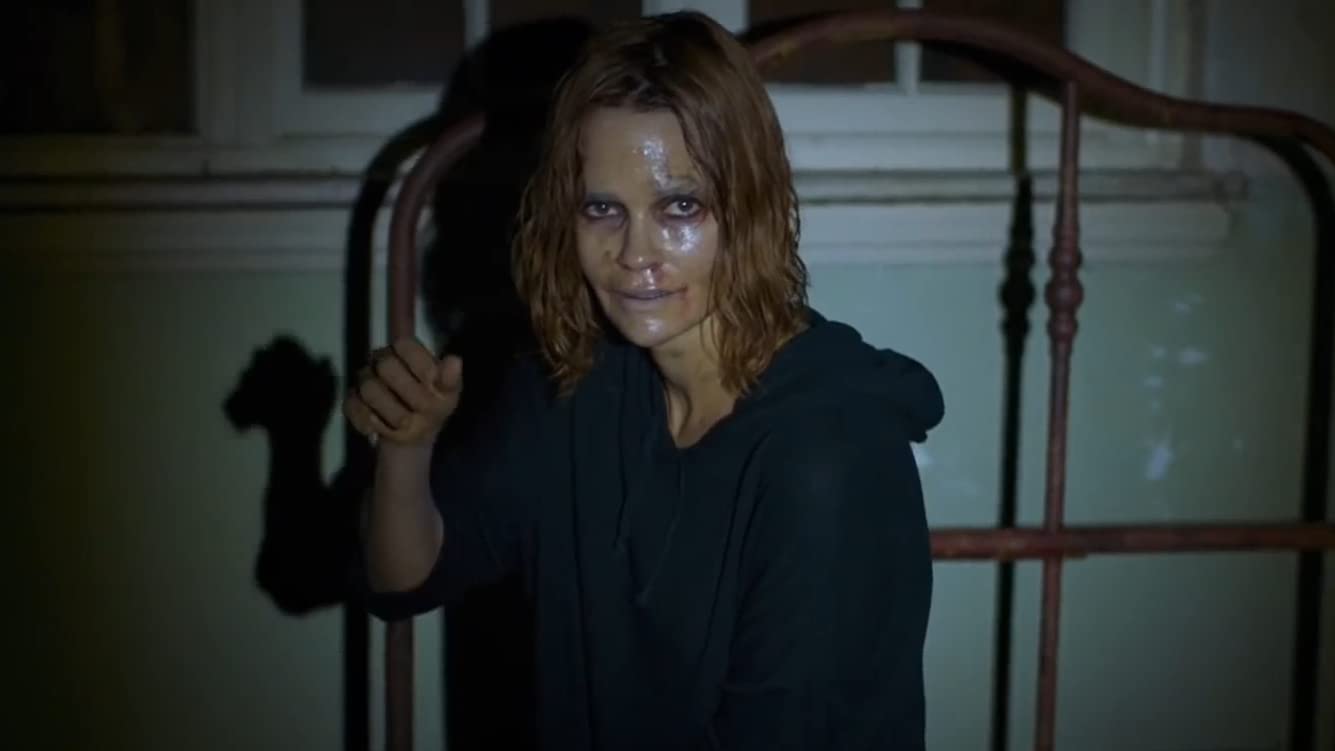What to Watch Verdict
'Demonic' struggles to be anything more than its sci-fi "volumetric capture technology," as the actual terror outside digital realms is virtually non-existent.
Pros
- +
😴 Listen, the tech is momentarily cool.
- +
😴 Beast design is rad.
Cons
- -
😴 Performances are plain.
- -
😴 The horror aspects lack invigoration.
- -
😴 Too much is hooked into audiences being impressed by a gimmick.
A title as lip-smackingly descriptive as Demonic surely should bring more to the altar than a bone-beaked plague demon, but I assure you that’s not the case. Neill Blomkamp takes a stab at the horror genre that’s easily parried, never more conscious about what makes scary movies tick beyond an arsonist entity. Blomkamp’s ambitions are focused primarily on the simulation program he uses as his narrative's backdrop, basically Second Life graphics, like we're watching an artificially intelligent video game. We know his Oats Studios have been obsessed with digital genre effects—they’re just so lifeless in this usage. Everything outside the virtual realm boils down to basicness that appreciates horror at its most oblivious and, in spots, laziest conceptualization.
Carly Spenser (Carly Pope) lives every day as the stigmatized daughter of Angela (Nathalie Boltt), a convicted senior home murderer. Childhood friend Martin (Chris William Martin) contacts Carly with an opportunity, and she’s faced with a choice—ignore Martin’s message, or reunite with her now comatose mother in a digital recreation of Angela’s subconscious. She chooses the latter, meeting Therapol physician Michael (Michael J. Rogers) and neuroscientist Daniel (Terry Chen). When Carly jacks into their medicinal matrix, she confronts Angela over the fallout of her misdeeds—then Angela begs Carly to flee, stating that she did not call her daughter to this alternate realm.
Blomkamp is enamored with his cutting-edge volumetric capture technology (a three-dimensional video technology that turns actors into geometric objects), with many critics already joking about its similarities to The Sims. The glitchy pixelation does present a recreation of reality that’s visually unique but unlocks no further boundaries of horror. Demonic attempts to establish stakes as Carly is wounded in the flesh despite being neurologically linked, yet there’s never an intense fear that generates inside a computer. It’s a nifty technique that adds nothing to a basely valued horror screenplay so disconnected with its human characters outside the impressively rendered gimmick.
It’s a shame that a film so plugged-in concerning software is disconnected elsewhere, as Carly chases a monster who may or may not have possessed Angela to kill all those elders. Blomkamp honors creepiness with sacrificial imagery of slaughtered animals but distracts audiences from more intriguing subplots such as Therapol’s facade. There’s a larger B-movie in here somewhere about gun-toting, SWAT-squad priest mercenaries who gear themselves with assault weapons to take on the film’s summoned demon—one that Blomkamp handles entirely off-camera. Demonic is a film of teases, outside of a single contortionist’s attack one night in what I’ll classify Blomkamp’s only remotely successful thrill as someone like Twisty Troy James might execute in-costume.
Performances plug their stereotypes from Carly’s devotion to setting her mother’s soul free to Michael’s unbelieved conspiracy rattler, who has a shipping container filled with occult research. Kandyse McClure portrays the peppy and innocent best friend who keeps appearing at random; then there’s the clear-and-present liar in Michael J. Rogers. Expect nothing unpredictable nor actors who thrive outside crudely outlined roles that do nothing to embellish building blocks. It’s almost as if Blomkamp intends to be the first to prove horror can be more than jump scares—gaze upon the heartbreak and drama—without recognizing generations' worth of heralded titles that have excelled at being richly developed emotional terror-tales.
It’s an issue when innovation like Demonic barely registers as forgettable. Neill Blomkamp relegates horror and promotes his motion-capture experimentation, which is a gamble that’ll lose yawning viewers. We’ve seen what Blomkamp can do—there’s no ignoring District 9—but this is a misguided attempt at fiddling with new cinematic toys. Even worse, the filmmaker's temptation to replicate “screen life” adjacent scenarios is over the ninety-minute mark for a story that barely deserves eighty in terms of any twists, suspense, or swings. It’s not that we’ve seen this before, more how we’ve seen this package with double the emotional resonance and triple the frights—nifty gadgetry, though.
The latest updates, reviews and unmissable series to watch and more!
Matt Donato is a Rotten Tomatoes approved film critic who stays up too late typing words for What To Watch, IGN, Paste, Bloody Disgusting, Fangoria and countless other publications. He is a member of Critics Choice and co-hosts a weekly livestream with Perri Nemiroff called the Merri Hour. You probably shouldn't feed him after midnight, just to be safe.


